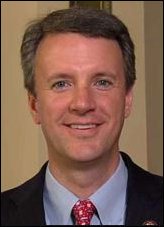A lot of things are happening in our dysfunctional health care system outside the public view. But every so often, a piece of flotsam pops to the surface that reveals the rent-seeking behavior by private interests in a system regulated at every level by government. The latest revelation concerns two private equity-backed physician-staffing groups behind a $28 million national ad campaign aimed at pressuring members of Congress, including Rep. Ben Cline, R-Rockbridge.
This particular incident also illustrates the role of dark money in our political system. Rather than influence elected officials directly by contributing to their campaigns, this initiative sought to pressure them by influencing their constituents.
By way of background, many hospitals — including those in Virginia — staff their emergency departments with physicians who belong to TeamHealth, Envision Healthcare, or other groups that specialize in operating emergency rooms. Emergency medicine is a specialized niche, and these firms claim to do a better job of managing emergency rooms than most hospitals can themselves. This TeamHealth white paper describes how outsourcing can “transform” hospital emergency departments when “patient flow is crawling, outcome measures are flagging, and there’s bad blood among physicians.”
Outsourcing contributes to the “surprise billing” phenomenon, which state and federal legislators are grappling with. Many patients subscribe to health care plans that restrict their provider networks as a way to control costs and keep insurance premiums lower. Patients often seek medical attention at a hospital that is in the network but whose emergency room physicians are not. Then they get bushwhacked by ER physician bills at out-of-network rates. Now Congress is debating legislation that would address surprise bills by setting benchmarks under which “out-of-network physician charges are paid by the patient’s health plan based on an average of what other in-network doctors in the area are paid,” according to Kaiser Health News, as reported by The Virginia Mercury.
Enter “Doctor Patient Unity,” a group funded by TeamHealth and Envision Healthcare that has been spending $28 million on an ad campaign aimed at influencing the constituents of about 50 members of Congress, of whom Virginia’s Ben Cline is one. Doctor Patient Unity supports legislation that would call for arbitration between providers and insurance companies “to determine a fair price in the event of a balance bill.”
“We oppose insurance-industry-backed proposals for government rate setting that will lead to doctor shortages, hospital closures and loss of access to medical care, particularly in rural and underserved communities,” a spokesman told the New York Times.
At the state level, says Virginia Mercury, regulators are considering rules that require hospitals to warn patients seeking non-emergency care in advance if they’re likely to encounter an out-of-network provider that would bill them more.
Bacon’s bottom line: Doctor Patient Unity’s $28 million ad campaign consisting of television and radio, direct mail, Facebook, and Google, warned of “government rate setting” that could affect patient access to doctors in an emergency. For a long time, the group did not reveal who was backing it financially. Guessing who was behind the ads became “something of a parlor game” in Beltway circles, says the NY Times. After intense media inquiries, representatives of the two physicians groups confirmed earlier this month that they had funded the group.
A key take-away from the Doctor Patient Unity incident is that advocacy and special interest groups routinely spend millions of dollars to influence politicians indirectly — by influencing their constituents — and this money is very difficult to track. Contributions to political campaigns are just the tip of the iceberg. If Virginians want to fully understand the role of money in politics, we need to make the dark money transparent.



